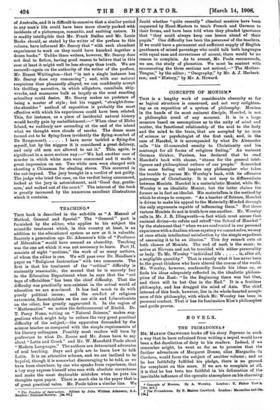CONCEPTS OF MONISM.* THIS is a lengthy work of considerable
obscurity so far as logical structure is concerned, and not very enlighten-
ing as an exposition of a system of philosophy. Monism. in the hands of its most eminent disciple, Haeckel, is not. a philosophic creed of any moment. It is in a large measure based on assumptions as to the unity of mind and matter, the functional relationship of the soul to the body and the mind to the brain, that are accepted by no man of science or psychologist of the first rank, and, in the case of Haeckel,'it is accompanied by what Dr. Alexander calls " his ill-concealed enmity to Christianity and hia contempt for all forms of religious feeling." An eminent German thinker, Paulsen, has declared that he read. Haeckel's book with shame, "shame for the general intel- ligence and philosophical culture of our people." Somewhat the same feeling will inspire any philosopher who takes the trouble to peruse Mr. Worsley's book, with its offensive patronage of Christianity. It is not easy to differentiate between Monists. Haeckel is a materialistic Monist, while Mr. Worsley is an idealistic Monist; but the latter claims the former as in fact an idealist. His materialism is the method by which he stoops to conquer. " As a teacher of Science, Haeckek is driven to make his appeal to the Materially-Minded through- the only arguments capable of influencing them:" But these various Monists do not in truth love one another. Mr. Worsley calls in Mr. J. R. Illingworth—a fact which must amuse that- eminent divine—to refute and rebuff "the School of Haeckel by the statement that " when we are confronted in our personal experience with a dualism whose mystery we cannot solve, we may at once attain intellectual satisfaction by the simple expedient of assuming it to be an illusion." This dry remark cuts at. both classes of Monists. The end of each is the same : to. arrive at Nirvana and not be troubled with either personality or body. To Mr.. Worsley " individual life is after all, a negligible quantity." That is exactly what it has never been to the great thinkers who have altered the course of the world. Mr. Worsley, however, confessedly founds his ideas on, or finds his ideas adequately reflected in, the idealistic philoso- phies of the East: "In the Beginning there was but One, and there will be hitt One in the End." It is a fruitless philosophy, and has drugged the mind of Asia. The chief_ interest of this book, however, lies in its whole-hearted accept- ance of this philosophy, with which Mr. Worsley has been in personal contact. That it has its fascination Kim's philosopher and guide proves.










































 Previous page
Previous page